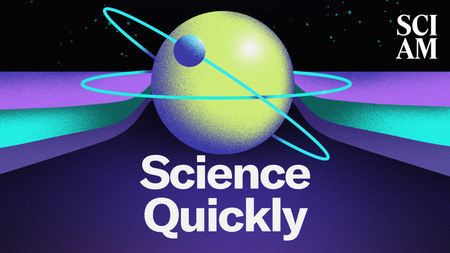
Could Weight-Loss Treatments Lead to an Uptick in Scurvy?
We cover a 3.26-billion-year-old meteorite impact, the spread of bird flu and a scurvy case study that serves as a cautionary tale in this week’s news roundup.
Jeff DelViscio is currently Chief Multimedia Editor/Executive Producer at Scientific American. He is former director of multimedia at STAT, where he oversaw all visual, audio and interactive journalism. Before that, he spent over eight years at the New York Times, where he worked on five different desks across the paper. He holds dual master's degrees from Columbia in journalism and in earth and environmental sciences. He has worked aboard oceanographic research vessels and tracked money and politics in science from Washington, D.C. He was a Knight Science Journalism Fellow at MIT in 2018. His work has won numerous awards, including two News and Documentary Emmy Awards.

Could Weight-Loss Treatments Lead to an Uptick in Scurvy?
We cover a 3.26-billion-year-old meteorite impact, the spread of bird flu and a scurvy case study that serves as a cautionary tale in this week’s news roundup.
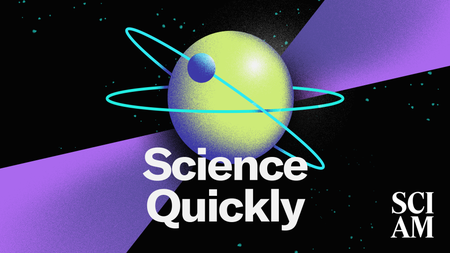
What Do Societal Beauty Standards Have to Do with Breast Cancer?
An epidemiologist explores a troubling rise in early-onset breast cancer diagnoses and discusses the potential link to chronic exposure to endocrine disruptors.

Microbes Are Evolving to Eat Cleaning Supplies, and Whooping Cough Is Making a Comeback
Kick off the week by catching up on the latest science news.

The Doctor Will See You, And Stop Judging You, Now
How do you stop implicit bias from getting in the way of better health? This doctor wants to make learning how to manage bias as important as learning how to suture.
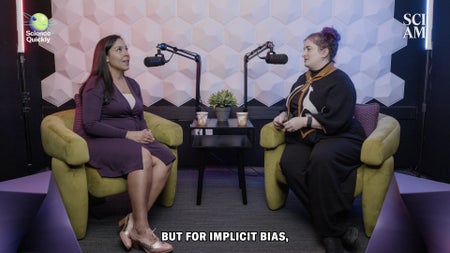
What is Implicit Bias, and how Might it Affect Your Next Medical Visit?
We talk to Cristina Gonzalez, a physician at New York University, who runs a lab that uses simulations to help medical professionals check their implicit bias at the exam room door.
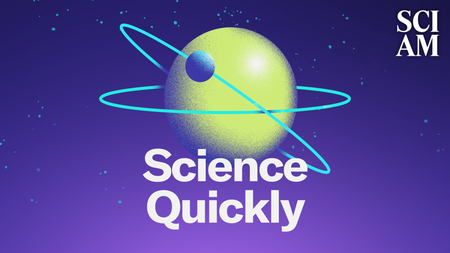
Traditional Music Shows Global Similarities in How We Sing
What can singing tell us about how we’re wired—and how our ancestors evolved?

The Danger of Hurricane Downpours and the End of ‘Climate Havens’
Downpours from hurricanes are worsening—and leaving even “climate havens” vulnerable.

Infinite Tiling Presents a Modern Mathematical Challenge
Today’s mathematicians grapple with higher-order mathematical questions and real-world applications.

Is Math Part of Nature or an Invention of the Mind?
Mathematics communicator and drag queen Kyne Santos guides you through the ongoing debate about what math really is.

People with PCOS Face Increased Eating Disorder Risks
A study reports higher prevalence of eating disorders among people with polycystic ovary syndrome, regardless of their body mass index.

How Pregnancy Changes the Brain, and How Lizards Make DIY Scuba Gear
This week’s news roundup explores how the brain is affected by pregnancy, the way “scuba diving” lizards breathe underwater, and much more.

Finding Math’s Beauty and Power with Drag Queen Kyne Santos
Mathematics communicator and drag queen Kyne will help you discover the beauty and power of math in this miniseries.
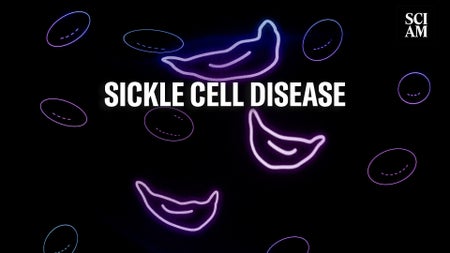
What Is Sickle Cell Disease?
You have around 35 trillion red blood cells moving around your body at all times. Typically they are rounded and flexible. What happens when they aren’t?

AI Takes on Conspiracies; Massachusetts Tackles Trash
AI fights conspiracy theories, Massachusetts leads the way on waste reduction, and more in this week’s science news roundup

See the Skies Differently with Astronaut and Photographer Matthew Dominick
NASA flight engineer Matthew Dominick’s astrophotography helps us see our world—from space

Discrimination Could Be Making People of Color Age Faster
Understanding how racism affects aging and the timing of menopause could lead to better screening and preventive care.

The Pitfalls of Houseplant Collection
A curator at the New York Botanical Garden explains what we can learn about the past and the present from houseplant trends.

‘Dark Oxygen’ from Seafloor Deposits Perplexes Researchers
Polymetallic blobs are producing “dark oxygen” from the depths of the ocean—and no one knows exactly how.

James Cameron’s OceanXplorers Shows Scientists at Work
James Cameron takes us behind the scenes and beneath the waves in a discussion of the new National Geographic show OceanXplorers on today’s episode of Science Quickly.

Extreme Conditions and Ethical Dilemmas: The Archaeology of Human Sacrifice
A mountaintop burial site offers a glimpse into Inka life—but raises ethical questions about unearthing ancient human remains.

Healthy Coral Reefs Sound like a Symphony
Coral reef soundscapes could help researchers assess their overall health.

How Ancient Humans Interpreted the Cosmos
Archaeoastronomers piece together how people understood the heavens thousands of years ago.

The Long History of Sex Testing in the Olympics and Other Elite Sports
Here’s the long history of sex testing in elite sports like the Olympics and where the science really stands.

Heat Records, Unexpected Downpours and Extreme Animals
We cover extreme weather, cocaine sharks and komodo dragons with iron-tipped teeth in this week’s news roundup.